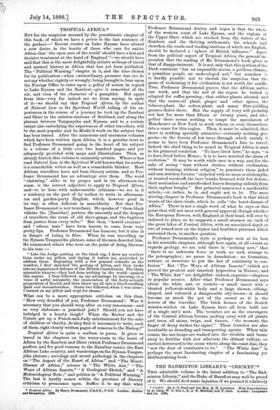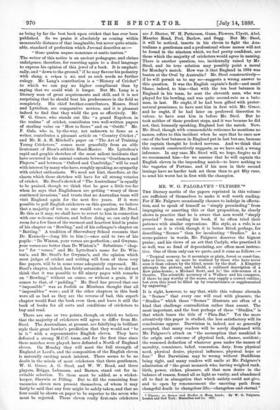THE BADMINTON LIBRARY'S "CRICKET?' THis admirable volume is the latest
addition to "The Bad- minton Library," arid the Duke of Beaufort may well be proud of it. We should do it some injustice if we praised it relatively
• Cricket. By A. G. Steel and the Hon. R. H. Lyttelton. With Contributions by A. Lang, W. G. GraLe, It. A. H. Mitchell, and F. Gale. London : Longman& and Co. Da.
as being by far the best book upon cricket that has ever been published. So we praise it absolutely as coming within measurable distance of that imaginable, but never quite attain- able, standard of perfection which Juvenal describes as :— " Rune qualem nequeo monstrare et sentio tantum."
The writer of this notice is an ancient pedagogue, and claims indulgence, therefore, for resorting again to a dead language to express his opinion of this jewel of a book. It is emphati- cally, and "down to the ground," if he may flavour his pedantry with slang, a XaiiiCOC 4 cid, and as such needs no further eulogy. Mr. Lang's contribution is a "History of Cricket" to which we can pay no higher compliment than by saying that we could wish it longer. But Mr. Lang is a literary man of great acquirements and skill, and it is not surprising that he should beat his predecessors in the field so completely. His chief brother-contributors, Messrs. Steel and Lyttelton, are comparative novices, and it is pleasant indeed to find that they wield the pen so effectively. Mr. W. G. Grace, who stands out like "a grand Napoleon. in the realms" of cricket, contributes two well-written papers of sterling value on "How to Score" and on "Outfit." Mr. F. Gale, who is, by-the-way, not unknown to fame as a writer, contributes a pleasant article on "Country Cricket ;" and Mr. R. A. H. Mitchell's paper on "The Art of Training Young Cricketers," comes most gracefully from an able lieutenant of Eton's athletic Head-Master. Mr. Lyttelton's rapid and graphie sketches of the most salient incidents that have occurred in the annual contests between "Gentlemen and Players," and between "Oxford and Cambridge," will be read with interest by many who have, roughly speaking, no sympathy with cricket enthusiasts. We need not hint, therefore, at the charm which these sketches will have for all strong votaries of cricket. Mr. Steel's sketch of "The Australians" is equally to be praised, though we think that he goes a little too far when he says that Englishmen are getting "weary of these continued invasions," and trusts that no Australian team will visit England again for the next five years. If it were possible to poll English cricketers on this question, we believe that a majority of ten to one would vote against Mr. Steel. Be this as it may, we shall have to revert to him in connection -with our welcome visitors, and before doing so, can only find room for a few lines of the warmest and heartiest kind in praise of his chapter on "Bowling," and of his colleague's chapter on "Batting." A tradition of Shrewsbury School recounts that Dr. Kennedy—(long life to him !)—once said to two of his pupils; "De Winton, your verses are perfection ; and Gwynne, your verses are better than De Winton's." Substitute " chap- ter" for "verses," and Mr. Lyttelton's name for De Win- ton's, and Mr. Steel's for Gwynne's, and the opinion which most judges of cricket and writing will form of these very fine papers, will be in some sense adequately expressed. Mr. Steel's chapter, indeed, has fairly astonished us, for we did not think that it was possible to fill ninety pages with remarks on "Bowling," without an ounce, or without a grain, if it comes to that, of " padding." Mr. Steel has proved that our " impossible " was as foolish as Mirabeau thought that all " impossibles " were ; and if the other chapters in this book were all as bad as they are the reverse of bad, this superb chapter would float the book even then, and leave it still the book of books for all sorts and conditions of cricketers to buy and read.
There are one or two points, though, on which we believe that the majority of cricketers will agree to differ from Mr. Steel. The Australians, at present, are falsifying in brilliant style their great bowler's prediction that they would not "be in it" with a representative English eleven. They have defeated a strong M.O.C. team, and for the first time since these matches were played, have defeated a North of England eleven. On Monday they will meet the full strength of England at Lord's, and the composition of the English eleven is naturally exciting much interest. There seems to be no doubt in the minds of most cricketers that three gentlemen, W. G. Grace, A. G. Steel, and W. W. Read, and three players, Briggs, Lolunann, and Barnes, stand out for in- evitable selection. To them must be added, as a wicket- keeper, Sherwin or Pilling. But to fill the remaining four vacancies eleven men present themselves, of whom it may fairly be said that any four might be safely taken, and that no four could be shown on paper to be superior to the seven who mast be rejected. These eleven really first-rate cricketers
are J. Shuter, W. H. Patterson, Gunn, Flowers, trlyett, Abel, Maurice Read, Peel, Barlow, and Sugg. But Mr. Steel, it will be noticed, inserts in his eleven to fight the Aus- tralians a gentleman and a professional whose names will not be found in the nineteen which, we feel pretty confident, are those which the majority of cricketers would agree in naming. There is another question, too, incidentally raised by Mr. Steel, and its true solution may possibly point a moral for Monday's match. How was it that England in 1884 was beaten at the Oval by Australia? Mr. Steel constructively— if he will permit us to say so—suggests a wrong answer to this question. It was the English captain's fault—and small blame, indeed, to him—that with the ten best batsmen in England in his team, he sent the eleventh man, who was played for his bowling, and was quite second-rate as a bats- man, in last. He ought, if he had been gifted with preter- natural prescience, to have sent him in first with Mr. Grace, and he ought, if he had later on preferred discretion to valour, to have sent him in before Mr. Steel. But he took neither of these prudent steps, and it was because he did not, that, humanly speaking, England lost the match. Now, Mr. Steel, though with commendable reticence he mentions no names, refers to this incident when he says that he once saw one of the best batsmen in England put in last but one, because the captain thought he looked nervous. And we think that this remark constructively suggests, as we have said, a wrong inference. In any case, Mr. Steel will, we hope, forgive us if we recommend him—for we assume that he will captain the English eleven in the impending match—to leave nothing to the vagaries of Fortune, and if his men in their second innings have no harder task set them than to get fifty runs, to send his worst bat in first with the champion.



































 Previous page
Previous page